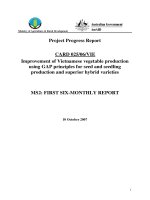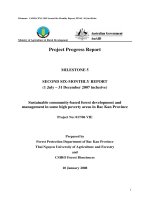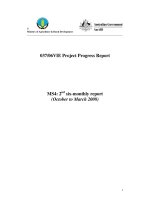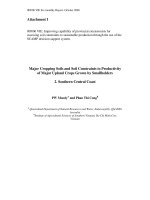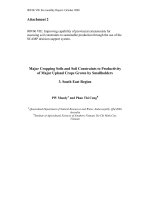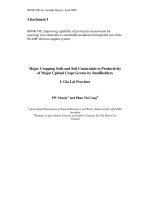Dự án nông nghiệp " Improvement of Vietnamese vegetable production using GAP principles for seed and seedling production and superior hybrid varieties " MS2 docx
Bạn đang xem bản rút gọn của tài liệu. Xem và tải ngay bản đầy đủ của tài liệu tại đây (120.29 KB, 16 trang )
Ministry of Agriculture & Rural Development
Project Progress Report
CARD 025/06/VIE
Improvement of Vietnamese vegetable production
using GAP principles for seed and seedling
production and superior hybrid varieties
MS2: FIRST SIX-MONTHLY REPORT
10 October 2007
1
Table of Contents
1. Institute Information ___________________________________________________ 1
2. Project Abstract _______________________________________________________ 2
3. Executive Summary ____________________________________________________ 2
4. Introduction & Background _____________________________________________ 2
5. Progress to Date_______________________________________________________ 3
5.1 Implementation Highlights________________________________________________ 3
5.2 Smallholder Benefits _____________________________________________________ 4
5.3 Capacity Building _______________________________________________________ 4
5.4 Publicity _______________________________________________________________ 4
5.5 Project Management _____________________________________________________ 4
6. Report on Cross-Cutting Issues___________________________________________ 5
6.1 Environment ___________________________________________________________ 5
6.2 Gender and Social Issues _________________________________________________ 5
7. Implementation & Sustainability Issues ____________________________________ 5
7.1 Issues and Constraints____________________________________________________ 5
7.2 Options ________________________________________________________________ 5
7.3 Sustainability ___________________________________________________________ 6
8. Next Critical Steps _____________________________________________________ 6
9. Conclusion ___________________________________________________________ 6
10. Statuatory Declaration__________________________Error! Bookmark not defined.
1
1. Institute Information
Project Name
Improvement of Vietnamese vegetable
production using GAP principles for
seed and seedling production and
superior hybrid varieties
Vietnamese Institution
Fruit and Vegetable Research Institute
Vietnamese Project Team Leader
Associate Prof Dr. Tran Khac Thi.
Australian Organisation
Centre for Plant & Food Science
University of Western Sydney
Australian Personnel
Robert Spooner-Hart
Oleg Nicetic
Tony Haigh
Peter Hanson (AVRDC)
Date commenced
March 2007
Completion date (original)
February 2010
Completion date (revised)
Reporting period
September 2007
Contact Officer(s)
In Australia: Team Leader
Name:
Robert Spooner-Hart
Telephone:
0245 701429
Position:
Associate Professor,
Leader Sustainable Plant Production
Systems
Fax:
0245 701103
Organisation
Centre for Plant & Food Science
University of Western Sydney
Email:
r.spooner-
In Australia: Administrative contact
Name:
Mr Gar Jones
Telephone:
0247360631
Position:
Director, Office of Research
Services
Fax:
024736 0905
Organisation
University of Western Sydney
Email:
In Vietnam
Name:
Telephone:
Position:
Fax:
Organisation
Email:
1
2. Project Abstract
The project aims to develop capacity in three Vietnamese research organisations, the Fruit and
Vegetable Research Institute Hanoi, Hue University of Agriculture and Forestry and the Potato
Vegetable and Flower Research Centre Institute Da Lat, in evaluation and use of disease-resistant
hybrids as part of Good Agricultural Practice (GAP) in vegetable production. Superior tomato
hybrids resistant to geminivirus from the World Vegetable Centre as well as cucurbits resistant to
mildews, will be evaluated for performance in North, Central and Central Highlands regions over
two seasons. Superior varieties will be used in farmer demonstration trials in five locations in each
region, together with IPDM involving use of PSOs and record keeping. Farmers will participate in
demonstration trial evaluations, which will be supported by Farmer Field Schools conducted by
PPD. The project includes key commercial companies, and will involve them in developing GAP
for seed and seedling production. Training will include a technical visit to Australia and
workshops. Selected superior germplasm will be supplied to seed companies for production and
distribution to farmers. The project will reduce use of pesticides in vegetable production, increase
food safety and farmer incomes. It will also reduce Viet Nam’s reliance on imported vegetable
seed.
.
3. Executive Summary
The project is on target to achieve its milestones. A successful stakeholders meeting was held
in February 2007, at FAVRI, Hanoi, followed by visits to the 3 regions to finalise the variety
evaluation trials. Vegetable varieties have been selected by all of the project participating
evaluators (including local and new varieties), and required tomato seed material has been
produced and sent to the participants by Peter Hanson, AVRDC. The first season’s variety
evaluations have commenced in Hanoi and Lam Dong, and will commence in the HUAF in
November 2007. Visits and interviews for the baseline study, interviewing vegetable seed
and seedling producers in the Red River Delta, Central Coast and Lam Dong/HCMC as well
as Hanoi vegetable markets were conducted in July by staff from FAVRI with Robert
Spooner-Hart and Oleg Nicetic. Interviews of Metro Staff will be conducted in December.
The GAP workshop has been scheduled in Hanoi for early December, and a workshop
schedule and participant list has been completed. Planning with PPD and NIPP for TOT and
FFS components of the project in 2008 is underway.
4. Introduction & Background
Vegetable production in Viet Nam has increased by around 30% in the last decade with an
area of 614,500 ha planted in 2005. Average productivity in 2004 was 14.8 tons/ha with the
total annual production exceeding 9 million tons. Higher production has allowed increased
domestic per capita vegetable consumption as well as export of a range of vegetables.
Vegetables constitute 60% of the total value of Vietnamese exports of fruit, vegetables and
ornamental plants, which had an average annual value of US$224.4 million in the period
2000-2004 with a target of US$690 million to be reached by 2010. Tomato and cucumber
and other cucurbits are the most stable of vegetable export products. Tomato can be produced
for 9 months of the year and provides a much higher net return than rice (30 million VND/ha
2
for tomato vs 15 million VND/ha for rice), making tomato production a popular choice for
farmers. Despite the substantial and largely successful development of vegetable production
in Viet Nam, vegetable farming still faces considerable problems, particularly quality
production of vegetable seed and seedlings, and vegetable food safety. In Viet Nam
approximately 8000 tonnes of vegetable seeds are planted every year. More than half of these
seeds are imported, 41% is produced by local farmers and only 7% is supplied by local seed
companies. Seeds produced by local farmers are commonly of poor quality, resulting in low
yield while imported seeds cost the Vietnamese economy millions of dollars. Vegetable
seedling production in nurseries or by farmers in many provinces uses very simple
technology with high labour costs, which has further contributed to low farm yield and
production efficiency. With the increased intensity of vegetable production, concerns about
vegetable food safety have escalated, especially the high quantity of pesticides (10 -12 times/
plant cycle) and fertilizers applied to small plots of land used for vegetable production,
particularly in peri-urban areas, in an attempt to boost production. The lack of pest and
disease tolerant/resistant varieties has added to this problem. Recent studies have found that
in Hanoi 9% of all vegetable samples exceeded pesticide residue limits by 5-10 times and 7%
of samples were found to have residues of banned pesticides. As a result, there are annually
thousands of food poisoning cases due to eating vegetables with high pesticide residues
(MALICA, 2003). In addition, pesticide overuse has resulted in increased pest damage
caused by natural enemy destruction and development of pesticide resistance.
Good agricultural practice (GAP) principles, together with results of several international
projects involving the current project collaborators, provide a solid base for improvement of
vegetable seed and seedling production that will result in increased production of safe, high
quality vegetables. The proposed project will utilise results from these projects to develop
pilot tomato and cucumber seed and seedling production systems primarily using TYLCV
and other disease-resistant tomato genetic material from AVRDC, and downy and powdery
mildew resistant cucurbit material developed in FAVRI, and comparing the production with
local varieties. The evaluation trials will be undertaken by the project’s collaborating
institutions over 2 seasons in 3 important vegetable production regions in Viet Nam, the Red
River Delta, the Central Coast and the Central/Southern Highlands. The demonstrated
superior varieties will be further evaluated in farmer demonstrations over 2 seasons, which
will form a key component, together with PSO-based IPDM, in Farmer Field Schools (FFS).
An identified serious capacity gap is that Viet Nam does not sufficient parental material to
allow production of virus-resistant hybrid varieties such as those developed in Taiwan at
AVRDC. After evaluation at these sites, superior varieties will be provided to commercial
seed and seedling producing companies.
The project will also develop GAP protocols for tomato and cucurbit seed, seedling and field
production, and a GAP manual. The project will also provide direct contact between leading
Australian and Vietnamese seed producing companies and seedling nurseries that will
facilitate introduction of high-quality production technology to Viet Nam.
5. Progress to Date
5.1 Implementation Highlights
The stakeholders’ meeting was held at FAVRI, Hanoi on March 1 2007, with 20 participants
(see Appendix 1). Following the meeting, Robert Spooner-Hart, Oleg Nicetic, Peter Hansen
and FAVRI staff Pham My Linh and Li Thi Ha travelled to HUAF, Lam Dong province and
3
IAS HCM City, to meet with researchers and inspect facilities for the evaluation trials and to
visit tomato, cucumber and other vegetable farmers.
In June-July 2007, Robert Spooner-Hart and Oleg Nicetic, with FAVRI staff, conducted a
baseline study of seed and seedling producers, as well having discussions with provincial
extension staff, in the Red River Delta (Hung Yen, Vinh Phuc), Central Coast (Da Nang,
Quang Nam) and Central/Southern Highlands (Lam Dong), and HCM city. Baseline survey
interviews were conducted in all locations. In addition, the team visited several communes
producing “safe vegetables”, although these were leafy vegetables: there are currently no
“safe” cucumbers or tomatoes produced in Viet Nam. The baseline survey included visits to
the Hanoi vegetable markets and to Metro, to assess quality, source and price of tomatoes
and cucumbers.
The selection of tomato and cucumber varieties (both introduced and local) for all evaluation
sites has been completed, together with development of protocols for evaluation trials.
Selected seed has been transferred from AVRDC to the project partners, and the first season
evaluations are currently underway in FAVRI and PVFC.
Oleg Nicetic visited FAVRI on September 24, 2007 to finalise the development of the GAP
workshop program, scheduled for early December.
5.2 Smallholder Benefits
It is too early in the project to see smallholder benefits. However, the project team identified
likely benefits during the March and June-July visits.
5.3 Capacity Building
FAVRI have played a major role in project coordination, and capacity for this activity has
been developed through interaction with the Australian and Vietnamese leading institutions.
In addition, UWS has developed an improved understanding of the range of technology and
skills in vegetable seed, seedling and vegetable production across a number of widely
dispersed regions in Viet Nam.
5.4 Publicity
University of Western Sydney has published a media release on the project, Addressing the
GAP in Vietnamese Vegetables in June 2007 (see Appendix 2). Is there any project
publicity: articles, radio, television etc. from FAVRI??
5.5 Project Management
The project management is progressing well, despite Robert Spooner-Hart experiencing
personal and health problems during this period.
The project team has gelled well, and we are pleased with the completion of project activities
to date. The Vietnamese Project Team has demonstrated good project management skills and
a significant insight into the project. They have translated all survey questions into
Vietnamese, assisted in conducting the baseline surveys, and will translate the survey
4
answers into English. Organisation has been very good, both of the stakeholders’ meeting
and the field visits, including baseline studies. The Australian participants have spent more
time in Vietnam on this project than initially envisaged, although Robert Spooner-Hart
experienced personal problems in May and July with death of his daughter and mother-in-
law, respectively. It should be noted that with Robert’s urgent departure from Viet Nam for
the funeral, FAVRI staff stepped in and completed the last of the surveys themselves.
6. Report on Cross-Cutting Issues
6.1 Environment
While it is still early in the project, the development of “safe vegetable” production in leafy
vegetables has been identified as a possible model for tomato and cucumber production.
The impact of drought (and therefore water shortage) on vegetable production was noted in
Lam Dong province in March 2007 and in Quang Nam province in July 2007. Continuing
problems with water shortage, at least at certain times in the year, may necessitate
investigation of more efficient water use technologies for economically sustainable vegetable
production.
In addition, Lam Dong is one of the provinces where grafting of tomatoes commonly takes
place for control of bacterial wilt, but this technique is rare in the other provinces, although a
workshop has been recently conducted by FAVRI. Thus we have identified that grafting of
tomatoes is a practice that could be introduced as part of GAP in the other project provinces.
6.2 Gender and Social Issues
The project team has a good gender balance, with 4 female plant breeders playing key roles.
There was also a reasonable gender balance in the seed and seedling producers/distributors.
This aspect will be reported further in the baseline survey report.
7. Implementation & Sustainability Issues
7.1 Issues and Constraints
An important constraint of the project is limited resources available to the Vietnamese
scientists and researchers, particularly those at FAVRI, to travel outside their local region.
This is an important issue in a multi-site project such as VIE 025/06. To facilitate this, UWS
has provided additional funding support for such travel. The recent rise in the value of the
AUD has also assisted funding for this activity.
7.2 Options
The timing of the visit to Australia by Vietnamese participants, scheduled for July 2008 has
been reviewed by the project management team. It was recognised that July was not optimal,
because of other project activities including the farmer baseline study in June-July, nor was it
an ideal time to see tomato and cucumber seedling and field production in Australia. We
have therefore decided to move this activity to October 2008.
5
7.3 Sustainability
No other issues have been identified to date.
8. Next Critical Steps
The baseline studies of seed and seedling production and exploration of Hanoi markets for
tomato and cucumbers will be completed, during the December 2007 visit by Robert
Spooner-Hart and Oleg Nicetic. This will involve interviews with senior staff from Metro,
and a further (winter) survey of the Hanoi markets to determine source, quality and price of
tomatoes and cucumbers, which will complement the summer survey. The Metro visit will be
facilitated through collaboration with personnel from CARD project VIE 021/06, and will
specifically address attitudes to and any marketing benefits of tomatoes and cucumbers
grown under GAP.
The GAP workshop will be held in Hanoi in December 3-5, 2007. The project team decided
to change the location of this workshop from Hue, because HUAF was unable to host the
workshop on their campus, and the high costs for a hotel venue in Hue, together with the
costs of internal air travel (particularly for the Vietnamese participants) made the projected
workshop budget prohibitive. The number of participants for this workshop is approximately
30. In addition, at least two Vietnamese and two Australian staff from CARD VN 021/06
will attend the GAP workshop, an agreement which was made during a meeting between
Gordon Rogers, Robert Spooner-Hart and Oleg Nicetic in August, 2007 .
Peter Hanson will visit the variety evaluation sites: namely FAVRI, HUAF and PVFC/Lam
Dong in December 2007, to assist in the first season variety assessments. The second season
evaluations will be conducted during the first 6 months of 2008. The project team will review
the success (and limitations) of the first evaluation trials, initially at the project review
meeting following the GAP workshop and then on completion of all trials in February-March
2008, and will modify the protocols and procedures for second trials accordingly.
9. Conclusion
A good working relationship has developed within the project leadership team. The high
level of enthusiasm for this project, efficient planning, and open communication between
project personnel and sustained efforts have resulted in completion of the project activities on
time. The first project review meeting, scheduled immediately after the GAP workshop,
should provide useful feedback from the participants, and may lead to some project
modifications.
6
7
Project Progress Against Proposed Objectives, Outputs, Activities And Inputs
Project Title: Improvement of Vietnamese vegetable seed and seedling production usin
g
GAP principles and superior h
y
brid varieties
Vietnamese Implementing Institution: Fruit and Vegetable Research Institute (FAVRI), Hanoi
PROPOSAL PROGRESS REPORT
Narrative Information Required Performance
Measures
Assumptions Information Required
OBJECTIVES
1. Conduct GAP baseline
study of vegetable seed and
seedling production facilities,
and draft protocols for seed
and seedling production
aligned to GAP principles
seedling production and (for
farmers IPDM, record keeping
and health & safety)
.
Baseline
established,
including
production and
financial
information
where possible
Enhanced
capacity of GOs
and to private
industry to
implement GAP
in vegetable
production.
Low risk, because
all key
collaborators
have experience
in surveying
farmers and key
producers in their
regions, and
UWS has already
conducted similar
surveys in
previous CARD
project
Also, the method
to be employed
has been proven
in previous
CARD projects
on citrus and in
The baseline study needs to be split into two parts,
with the first year (2007) compiling baseline data
for seed and seedling producers and year 2 (2008)
involving baseline data from farmers.
The reasons for this is that the villages where FFS
will be conducted had not been determined by July
2007, and the FFS do not commence until mid 2008
8
FAO projects on
other annual
crops including
rice.
2 Establish small-scale pilot
vegetable variety evaluation
and seedling production in
each of 3 regions based on
drafted protocols. Once
established, these production
facilities will be use for
demonstrations and training.
Trials and
facilities
established to
agreed
protocols, and
variety
evaluation trials
successfully
carried out to
provide data
required for
Objective 3.
Low risk as
collaborators in
all 3 locations
have capacity and
facilities to
conduct seedling
production and
varietal
evaluation.
UWS will provide
support for
experimental
design and
protocols.
Potential risks
occur with all
biological trials
associated with
weather and other
perturbations
Overall, consistent with original objectives.
However, as Lam Dong province does not produce
any cucumbers, some evaluation of cucumbers in
the south will be undertaken by the industry project
partner, SSC.
9
3. Evaluate new hybrids of
AVRDC’s TYLCV resistant
tomato varieties and mildew
resistant cucumber varieties
developed by FAVRI in 3
regions, as well as local
varieties
Varietal
evaluation
report
completed,
summarising
data at the 3
evaluation
locations for 2
seasons.
Results of trials
published in
refereed journal
Risk low, many
varieties for
evaluation
already identified,
satisfactory
discussions
already
completed with
AVRDC and
FAVRI for access
to their superior
varieties.
All participating
organisations
have good
experience with
variety evaluation
UWS will provide
biometrical
support.
See above. Seasons for evaluation do not fully
coincide in the 3 regions, but this does not impact
negatively on the project.
OUTPUTS
1.1 Establishment of baseline
data on current practices for
vegetable seed and seedling
production and development
of protocols for vegetable seed
and seedling production
aligned to GAP
.
Baseline data
report accepted
by CARD
Low risk, because
all key
collaborators
have experience
in surveying
farmers and key
producers in their
regions, and
UWS has already
conducted similar
See above. this work is on target to be completed
on time
10
surveys in
previous CARD
project
Also, the method
to be employed
has been proven
in previous
CARD projects
on citrus and in
FAO projects on
other annual
crops including
rice.
1.2 Development of baseline
GAP draft protocols
Final draft GAP
protocols
reported to
CARD and
accepted
As above These have been developed, but will be discussed
at the GAP workshop in December 2007
2.1 Draft evaluation trial
protocols completed
Draft evaluation
trial protocols
completed and
accepted by all
participants,
and availability
of suitable
facilities
confirmed
Low risk as
collaborators in
all 3 locations
have capacity and
facilities to
conduct seedling
production and
varietal
evaluation.
Evaluation protocols have been developed. They
now include more local varieties, and in some
cases, SSC varieties.
11
UWS will provide
support for
experimental
design and
protocols.
Potential risks
occur with all
biological trials
associated with
weather and other
perturbations
3.1 Superior seed varieties for
evaluation introduced and
distributed
Signed MTA
copy provided.
List of selected
varieties for
evaluation
accepted and
provided
Risk low, many
varieties for
evaluation already
identified,
satisfactory
discussions already
completed with
AVRDC and
FAVRI for access
to their superior
varieties.
Completed, seed sent and received.
3.2 Superior varieties
evaluated and determined over
2 seasons in 3 regions.
Experimental
data completed
and analysed.
Superior
varieties
identified.
Article written
on varietal trials
Risk quite low.
All participating
organisations
have good
experience with
variety evaluation
UWS will provide
biometrical
Evaluation trials underway at FAVRI and PVFC,
scheduled to commence in HUAF in late
November.
12
accepted for
dissemination.
support.
Possibility of
weather problems
impacting on
evaluations.
1.1.1 Establish survey
protocols
and final timetable/logistics,
stakeholder’s meeting
February
2007 (FAVRI)
Survey
protocols and
logistics written
Completed.
Stakeholders meeting held in FAVRI, February.
Survey protocols established, translated into
Vietnamese, and used in July stakeholders survey
1.1.2 Conduct 2 week baseline
study, July 2007 in 3 project
regions
Baseline study
completed
Completed in July
1.2.1 Interact between key
project collaborators following
baseline study to draw up draft
protocol
Draft protocols
drawn up for
discussion at
HUAF
workshop
Draft protocols partly drawn up, will be finalised
for the GAP workshop in December 2008.
1.2.2 Finalise draft protocols at
project workshop, HUAF
Draft protocols
agreed and
promulgated
Workshop scheduled for December 3-5.
ACTIVITIES
2.1.1 Evaluation protocols
discussed at project meeting in
July, if necessary by email.
Reviewed after first season in
December meeting (HUAF)
Reviewed
evaluation
protocols
finalised
Evaluation for first season discussed and finalised
in July. To be further discussed in project meeting
scheduled after GAP workshop, and at completion
of first season evaluation. (March 2008)
2.1.2 Confirm availability and
status of facilities at 3
Availability of
facilities
Completed. All three locations visited in February
and confirmed availability of suitable facilities for
13
locations for evaluation trials
and seedling production
confirmed evaluation trials.
3.1.1 Negotiate and sign
Materials Transfer Agreement
with AVRDC
MTA signed Completed. Discussions between FAVRI and
AVRDI ensured that previous agreements covered
MTA
3.1.2 Final identification of
latest AVRDC, FAVRI and
other varieties for evaluation
List of selected
varieties
Completed. Identification of varieties for evaluation
in season 1 finalised with AVRDC, FAVRI, HUAF
and PVFC
3.2.1 Trials conducted
according to protocols in
Objective 2
Trials
satisfactorily
completed
Trials currently underway in FAVRI, PVFC. To
commence in November in HUAF
3.2.2 Comparative data
analysed and compared across
all regions where appropriate
Data analysis
completed
Cannot be completed for season 1 until data from
all sites is received, in March 2008. Season 2
evaluation will not finish until mid-2008
INPUTS
Inputs provided are given in tables above. All
personnel and other inputs scheduled for the first 6
months have been delivered.
There are no issues relating to timely provision of
inputs. The Australian project leader had several
major personal and health issues in 2007, but it did
not interfere with the project activities. FAVRI staff
in one instance, conducted the final set of baseline
surveys because he had to return to Australia early.
14


